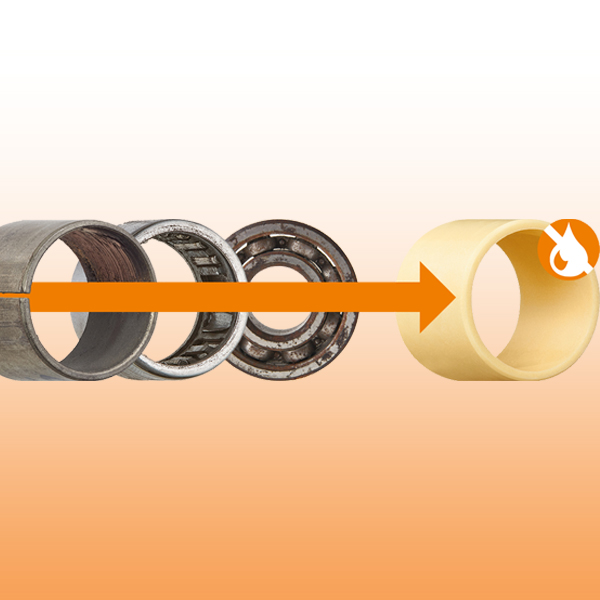
For more information about iglidur® plain bearings visit igus.co.uk/plainbearings
What quantity are the price breaks at?
igus® have multiple price breaks from 1 piece to 5000 pieces.
Do igus® manufacture custom bearing products?
Yes, we can machine, mould, 3D printing or laser cut, depending on the part. Please contact us for for information or a quotation here.
What iglidur® material works best in water?
igus® have a range of under water materials however, it will depend on your application which material you may need. Try our online configurator.
What iglidur® material would you recommend for my mountain bike?
iglidur®X bearings are usually the best for mountain bike application however depending on which part of the bike will depend on the material. Click here for some suggestions.
Alternatively, contact us here for an individual consultation.
Can I get parts machined to my drawing from you?
Yes, we can machine parts to your drawing, send us the enquiry via this form and you will get a quote by return, usually the same day, certainly within 24 hours.
How do you fit a plain bearing into a bearing housing?
igus® plain bearings are designed to be pressed into a housing (with an H7 tolerance) The bearing will have a nominal size for the outer diameter. They are then secured by the press-fit. Please be aware that the outside diameter of the bearing is, depending on the nominal size, about 0.1 to 0.25 mm larger than the housing in the non-pressed state. The inner diameter will reach its final dimensions and tolerances when pressed in.
How do your felt seals work on your iglidur® materials?
All of our bearings run dry as you know, but sometimes extreme applications require an extra seal. Rubber seals in abrasive environments do not work very well, they wear out very quickly, however felt seals act as a filter and a seal when running dry, keeping out those abrasive particles. This allows for the bearings to last much longer in these really extreme environments, agriculture being one of them.
What does a plain bearing do?
Plain and ball bearings are each based on different operating principles and therefore have different specifications. These specifications make them better or worse with regard to suitability for different applications. Plain bearings are one-piece components that consist of one or more materials and are intended to reduce friction either through integrated solid lubricants or additional lubrication. They are particularly suitable for applications in which a cost-effective and space-saving solution is required and where the combination of load and speed is not too high. Ball bearings consist of rings between which several balls or rollers are mounted. These rotate around the inner ring of the ball bearing and thus enable the adjacent components to move relative to each other. The advantage of ball bearings is precision, as they can be designed virtually clearance-free, as well as their particularly low rolling resistance. Similar to the coefficient of sliding friction of the plain bearings, this helps to make applications very smooth. However, plain bearings also require significantly more installation space for this. They are heavier, often more expensive and must be specially protected against dirt ingress and loss of lubricant.”
How are plain bearings lubricated?
Plain bearings can be lubricated with oils, grease or other lubricants. These can be costly, very messy and can cause issues in regards to maintenance time to keep the bearings in working order. One of the advantages about igus® bearings, as with all igus® products, is that they are lubrication-free. The range of plain bearings are manufactured in technical high-performance plastic which ensures the optimum running performances, longest and measurable service life and lowest friction values, all without the use of additional lubrication.
What are self-lubricating bearings?
Self-lubricating bearings are bearings that require no additional lubrication, no oil or grease. These self-lubricating bearings are composed of thermoplastics and fibre reinforcements which means they are with a self-impregnated with solid lubricants. This ensures that the bearings can run successfully without additional external lubrication. Without the need for environmentally damaging lubricants, this prevents downtime, saves money, and reduces the impact on the environment.
How do your smart bearings work?
As you know, our iglidur® bearings are injection moulded. The materials are homogeneous and this means that you get the same performance throughout the wall thickness. However, even with this predictable nature customers are demanding more high tech solutions to their reduction in downtime. So, we have designed and are now producing iglidur® bearings with a wear detecting system inside the material. This allows the bearing to have a set amount of wear and when the bearing reaches this, it sends a signal to a module which alerts the customer that the bearing is due to be inspected. The signal is not sent at a failing point but it will need to be looked at soon.
What is iglidur® made of?
iglidur® bearings are made up of high-performance polymers. There are many different materials to suit all environments and applications. Find out more about the different materials here.
Do igus® do a metal detectable material for bearings?
Currently not in the plain bearing range but we do offer them in the igubal range.
Where are plain bearings used?
Plain bearings are used everywhere! They are used in a large variety of applications and industries, many of which require a cost-effective solution whilst maintaining a long service life. igus® plain bearings offer both of these elements, along with being lubrication-free and maintenance free. All of these attributes combined ensures a clean, smooth running movement within machines and applications.
What do you test for in relation to rotational wear rate?
- Load per bearing point between 100 and 1,000N
- Surface speed between 100 and 1,300rpm
- Available shaft diameters:
6, 8, 10, 12, 13, 14, 15, 16, 17, 18, 20mm - Tests at room temperature and up to 150°C
- Underwater tests
Which materials do you test iglidur® products against?
We test them against the likes of POM-C, PEEK, PTFE , Nylon and many more.
Are igus® bearings toleranced?
Yes, the d1 dimension is but only after being press fit into the housing.
Can I measure the plain bearing before press fit?
No, in their free state these bearings will be oversized. They will only be in tolerance after press fit.
Have any of your bearings got WRAS approval?
Yes, our iglidur® A180 has this approval.
How are iglidur® plain bearings tested?
In more than 12,000 individuals tests a year on over 200 test rigs in the igus® test laboratory, all materials are thoroughly tested. The findings go into a unique knowledge database on the tribology of maintenance-free plastic plain bearings. This database enables us to select the ideal iglidur® plain bearing for our customers depending on the application and to calculate its anticipated service life.
Are plastic bearings as strong as metal ones?
This is dependent on the application. Mostly, igus® plastic bearings do not need to be stronger than metal bearings, but they will outlast them. Please email sales@igus.co.uk for some technical help or ring 01604 677240.
Why are there so many different iglidur® materials?
The variety of iglidur® materials has evolved over many years from a wide variety of customer requirements. The development of a plain bearing material often has something to do with squaring the circle. If an improvement is made in one particular direction, this usually happens at the expense of another specification. – Most technical applications can be covered by the five standard materials iglidur® G, J, X, W300 and M250.But when it comes to very specific or demanding applications, exhausting the last technical reserves or the last price-performance optimisation for high volume, the other iglidur® materials are becoming increasingly important. Moreover, the limits of use of non-lubricated plain bearings have shifted further in the last few years due to new iglidur® materials.





